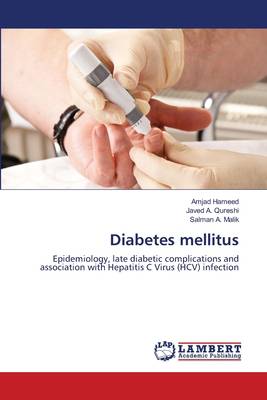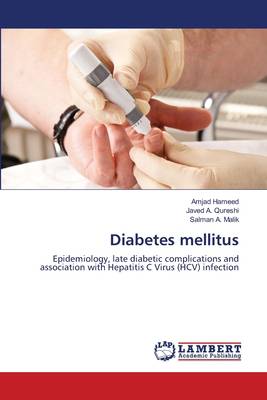
Bedankt voor het vertrouwen het afgelopen jaar! Om jou te bedanken bieden we GRATIS verzending (in België) aan op alles gedurende de hele maand januari.
- Afhalen na 1 uur in een winkel met voorraad
- In januari gratis thuislevering in België
- Ruim aanbod met 7 miljoen producten
Bedankt voor het vertrouwen het afgelopen jaar! Om jou te bedanken bieden we GRATIS verzending (in België) aan op alles gedurende de hele maand januari.
- Afhalen na 1 uur in een winkel met voorraad
- In januari gratis thuislevering in België
- Ruim aanbod met 7 miljoen producten
Zoeken
Diabetes mellitus
Epidemiology, late diabetic complications and association with Hepatitis C Virus (HCV) infection
Amjad Hameed, Javed A. Qureshi, Salman A. Malik
Paperback | Engels
€ 57,95
+ 115 punten
Omschrijving
Diabetes mellitus is a group of metabolic diseases characterized by hyperglycemia resulting from defects in insulin secretion, insulin action, or both. Here we focused on the epidemiology, late diabetic complications, association between diabetes mellitus and HCV infection and plasma protein profiling. Type 2 diabetes is most prevalent type and is more common in females. Above 70% diabetics had poor glycemic control along with one or more late diabetic complication(s) i.e. hypertensions, any grade of retinopathy and neuropathy. About 36.538% diabetic patients were reported to have HCV infection while in control group only 1.923% subjects were HCV positive by RT-PCR. Female diabetics have more risk to acquire HCV as compare to the male diabetic patients. Medical practices (hospitalization) play no role in nosocomial transmission of HCV in diabetic patients. Differences in the protein pattern were observed in low molecular weight proteins (5 to 35 kDa). Protein bands of 31kDa, 11kDa and 6.5kDa were missing in some diabetic HCV positive samples. Plasma protein profiling of diabetic patients by SDS-PAGE may be helpful to evaluate the disease state.
Specificaties
Betrokkenen
- Auteur(s):
- Uitgeverij:
Inhoud
- Aantal bladzijden:
- 104
- Taal:
- Engels
Eigenschappen
- Productcode (EAN):
- 9783659103391
- Verschijningsdatum:
- 24/04/2012
- Uitvoering:
- Paperback
- Afmetingen:
- 150 mm x 220 mm
- Gewicht:
- 155 g

Alleen bij Standaard Boekhandel
+ 115 punten op je klantenkaart van Standaard Boekhandel
Beoordelingen
We publiceren alleen reviews die voldoen aan de voorwaarden voor reviews. Bekijk onze voorwaarden voor reviews.









